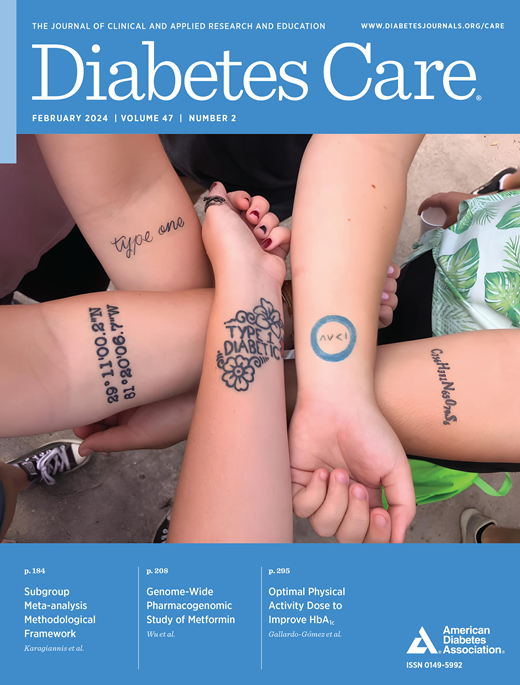Limitations in Achieving Glycemic Targets From CGM Data and Persistence of Severe Hypoglycemia in Adults With Type 1 Diabetes Regardless of Insulin Delivery Method
IF 14.8
1区 医学
Q1 ENDOCRINOLOGY & METABOLISM
引用次数: 0
Abstract
OBJECTIVE We captured continuous glucose monitoring (CGM) metrics from a large online survey of adults with type 1 diabetes to determine how glycemic outcomes varied by insulin delivery form. RESEARCH DESIGN AND METHODS Adults with type 1 diabetes from the T1D Exchange Registry/online communities completed the survey and contributed retrospective CGM data for up to 1 year. Self-reported glycemic outcomes and CGM measures were described overall and by insulin delivery method. RESULTS The 926 participants completed the survey and provided CGM data. Mean ± SD age was 41.9 ± 15.7 years, and 50.8% reported using automated insulin delivery (AID). While AID users spent more time in range, 27.9% did not achieve time in range targets, 15.5% reported severe hypoglycemic events (SHEs), and 16.0% had CGM-detected level 2 hypoglycemic events. CONCLUSIONS Despite use of diabetes technologies, many individuals are unable to achieve glycemic targets and experience severe hypoglycemia, highlighting the need for novel treatments.根据CGM数据实现血糖目标的局限性和1型糖尿病成人严重低血糖的持久性,无论胰岛素递送方法如何
目的 我们从一项针对 1 型糖尿病成人患者的大型在线调查中获取了连续血糖监测 (CGM) 指标,以确定不同胰岛素给药形式的血糖结果有何不同。研究设计和方法 来自 T1D Exchange Registry/在线社区的成年 1 型糖尿病患者完成了调查,并提供了长达 1 年的 CGM 回顾性数据。对自我报告的血糖结果和 CGM 测量进行了总体描述,并按胰岛素给药方式进行了分类。结果 926 名参与者完成了调查并提供了 CGM 数据。平均(± SD)年龄为 41.9 ± 15.7 岁,50.8% 的人报告使用了胰岛素自动给药(AID)。虽然自动胰岛素给药用户在血糖范围内花费的时间更多,但有 27.9% 的人没有达到血糖范围内的目标时间,15.5% 的人报告了严重低血糖事件 (SHEs),16.0% 的人发生了 CGM 检测到的 2 级低血糖事件。结论 尽管使用了糖尿病技术,但仍有许多人无法达到血糖目标,并出现严重低血糖,这凸显了对新型治疗方法的需求。
本文章由计算机程序翻译,如有差异,请以英文原文为准。
求助全文
约1分钟内获得全文
求助全文
来源期刊

Diabetes Care
医学-内分泌学与代谢
CiteScore
27.80
自引率
4.90%
发文量
449
审稿时长
1 months
期刊介绍:
The journal's overarching mission can be captured by the simple word "Care," reflecting its commitment to enhancing patient well-being. Diabetes Care aims to support better patient care by addressing the comprehensive needs of healthcare professionals dedicated to managing diabetes.
Diabetes Care serves as a valuable resource for healthcare practitioners, aiming to advance knowledge, foster research, and improve diabetes management. The journal publishes original research across various categories, including Clinical Care, Education, Nutrition, Psychosocial Research, Epidemiology, Health Services Research, Emerging Treatments and Technologies, Pathophysiology, Complications, and Cardiovascular and Metabolic Risk. Additionally, Diabetes Care features ADA statements, consensus reports, review articles, letters to the editor, and health/medical news, appealing to a diverse audience of physicians, researchers, psychologists, educators, and other healthcare professionals.
 求助内容:
求助内容: 应助结果提醒方式:
应助结果提醒方式:


